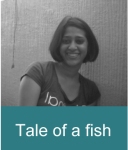
I just finished re-reading Toni Morrison’s Beloved a couple of days ago. Try reading a book you’ve studied as a text and with each word you relive whole chunks from your life from that time. Suddenly, a damp Bombay breeze turns into a sudden blast of dry Gujarat heat and the leaves outside your first floor Bandra balcony could be the leaves of the Neem tree outside Lecture Room 14, St Xaviers College, Ahmedabad.
As with all good books, I discovered new things and also had different reactions to old things, but one thing hadn’t changed. At 24, I’m still as baffled with the concept of magic realism as I was when I was 19. I found it difficult to digest then and I find it difficult to digest now. Truth be told, my mind is a little too rational to not balk at it.
If the term had to do with just fantasy, I would understand. I love and appreciate fantasy in fiction, but it’s fantasy. It’s supposed to have witches and ghosts and tall geniuses called Dumbledore. But magic realism, or what I understand of it, is a technique used in fiction that brings the decidedly unreal into the real world and turns a blind eye to the impracticality of such a bold move.
Take Beloved. You’re reading late into the night. Phrases like “The silence boomed about the walls like birds in a panic,” are jumping out at you and bludgeoning you with their sheer brilliance. The characters are so believable, their pain so fresh, their small joys so real, their circumstances so tangible and WHAM, just to fuck with you, there’s an element in there that can’t possibly be. Stop! your mind screams, this can’t be! And yet you know that it is so because, there really is no other way. Beloved, as those who have read the book will know, was taken from a real life story. In the Vintage International edition, Morrison explains in a foreword that she wanted the central figure to be “the murdered, not the murderer, the one who lost everything and had no say in any of it.” So that’s how we get 323 brilliantly crafted, breathtakingly poetic pages about a dead baby girl living as flesh and bone with the very mother who smashed her skull against a shed wall and killed her.
“Swallow it,” Morrison seems to be saying. “It’s their reality and it’s yours too.” But in my reality, the dead remain the dead and the living remain so until they’re dead and then new people are born and they live until they die and so on. I mean, that’s just the way it is.
Marquez’s One hundred years of solitude goes the same way. It’s perfectly acceptable for Prudencio Aguilar, dead, to converse with Jose Arcadio Buendia, alive. None of the other characters cares one whit. I mean, good god, didn’t One hundred years of solitude have enough characters in it already without Marquez bringing back the dead ones? To say nothing of course, of equally bizarre occurrences mentioned in passing, through the rest of the book.

And it’s not just ghosts either. Hands up if you re-read several passages from Salman Rushdie’s Midnights children, while you were reading it the first time. I thought so.
But forgive my confused rambling. Thus far I’ve mentioned three of the some of the greatest writers known to the modern world. Just goes to show that there’s some amount of genius involved in using magic realism, or any technique as bold, in literature. If I can’t get my head around it, it certainly isn’t because it’s badly written. A poor writer couldn’t possibly get away with it. Not that they don’t try. A certain book called “One night in a call centre” which is about exactly that plus some high handed preaching, has a scene involving a phone call from “God” to salvage a plot clot. Yep. Deus ex machina in the 21st century. That’s just how we IIM graduates roll.
Shudder. Sorry, that last paragraph left a bad taste in my mouth. Let’s rewind to where I say that Morrison, Rushdie and Marquez are three glorious beacons of unadulterated brilliance and have therefore with said brilliance, knocked mediocrity out of the world. Also they’ve earned the right to use as much magic realism as they please in their work. And though I may struggle with wrapping my unsophisticated head around it, I probably wouldn’t have it any other way.
– Sheena








